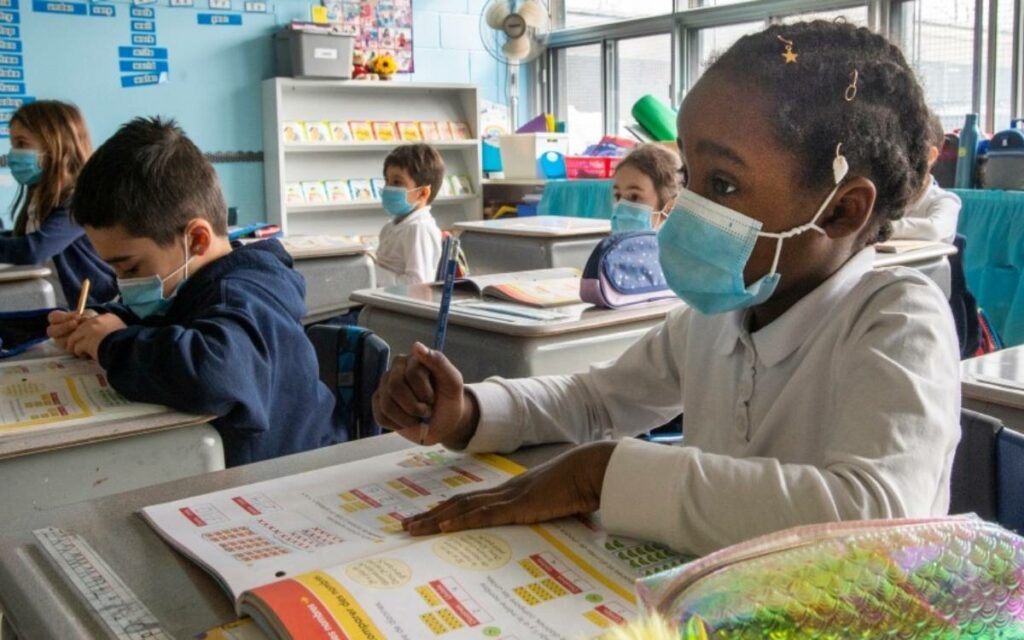
One of the measures includes the closure of schools. Photo credit: CTV News Toronto
So far in 2022 there are a number of COVID-19 response measures employers, businesses, and organizations alike in Ontario need to be aware of as we move forward.
Current Phase of Our Roadmap to Reopening
Effective Wednesday, Jan. 5, 2022 at 12:01 a.m. until at least Jan. 26, 2022 – subject to trends in public health and health system indicators – Ontario’s indoor response measures include:
- Limiting social gatherings to five people.
- Limiting organized public events to five people.
- Requiring businesses/organizations to ensure employees work remotely unless the nature of their work requires them to be on-site.
- Limiting capacity at public libraries, retail settings, personal care services, weddings, funerals, and religious services, rites and ceremonies to 50 per cent capacity. At shopping malls physical distancing is required in line-ups and loitering is not permitted.
- Closing food courts, dining in venues, concert venues, theatres, cinemas, rehearsals, meeting and event spaces, museums, galleries, zoos, science centres, landmarks, historic sites, botanical gardens, amusement parks, waterparks, tour and guide services, fairs, rural exhibitions, festivals, sport and recreational fitness facilities (with exceptions for select professional and elite athletes/leagues), horse racing, car racing, saunas, steam rooms, and oxygen bars.
- Restricting the sale of alcohol after 10 p.m. and the consumption of alcohol on-premise in businesses or settings after 11 p.m. (with select exemptions).
- Continuing delivery and takeout.
- Re-instituting remote learning until at least January 17.
- Limiting school building access to child care operations, in-person instruction for students with special education needs who cannot be accommodated remotely, and for staff who are unable to deliver quality instruction from home.
- Pausing all non-emergent and non-urgent surgeries and procedures.
Ontario Business Costs Rebate Program and Ontario Tax Payment Grace Period
The government is expanding the new Ontario Business Costs Rebate Program to eligible businesses, including those required to:
- Close or reduce capacity under the Roadmap will receive rebate payments for a portion of the property tax and energy costs incurred while subject to these measures.
- Reduce capacity to 50 per cent, will receive a rebate payment equivalent to 50 per cent of their costs.
- Close for indoor activities, such as restaurants and gyms, will receive a rebate payment equivalent to 100 per cent of their costs.
A list of eligible business types will be made available when applications for the program open later this month.
Effective Jan. 1, 2022, the government is also providing up to $7.5 billion for a six-month interest- and penalty-free period for Ontario businesses to make payments for most provincially administered taxes.
Minimum Wage Increases:
Under the Working for Workers Act (the “WWA”), as of Jan. 1, 2022, the following minimum wages are in place in Ontario:
- $15.00 – General workers and liquor servers up from $14.35 and $12.55 respectively;
- $14.10 – Student under the age of 18 who work 28 hours a week or less when school is in session or work during a school break or summer holidays up from $13.50;
- $16.50 – Homeworkers up from $15.80; and
- Hunting, fishing and wilderness guides: (a) $75.00 when working less than five consecutive hours in a day up from $71.75; and (b) $150.05 when working five or more hours in a day up from $143.55.
Thereafter, as part of the Ontario government’s plan to grow an economy that works for everyone, the minimum wage is set to continue to rise by the rate of inflation.
Work-Life Balance Rules
Recall also that under the WWA, Ontario businesses with 25 employees or more between January 1 and March 1 of each year must implement a written employment policy with respect to disconnecting from work at the end of the work day.
Staycation Tax Credit
Effective Jan. 1, 2022 Ontarians can apply for this refundable tax credit when they file their 2022 personal tax returns to get the benefit of a 20 per cent personal income tax credit on eligible accommodations up to a maximum of $1,000 for an individual ($200) and $2,000 ($400) for a family, even if no income tax is owed on an eligible accommodation expense within the province in the 2022 tax year for a leisure stay of less than a month. The expense must be subject to HST, paid for by the Ontario tax filer or their spouse, be supported by a detailed receipt, and cannot be reimbursed by anyone (including an employer).
Undoubtedly there will be further and other COVID-19 response measures that we will keep you apprised of.

Sheryl L. Johnson brings a proactive, creative, and vibrant attitude to her labour, employment and human resource law practice. Sheryl has extensive experience in representing clients in both the provincial and federal jurisdictions on all matters relating to employment and labour law, including for example construction labour law, employment related civil wrongful dismissal, human rights, and labour board litigation; privacy, governance, statutory and regulatory compliance, and executive compensation matters; as well as conducting workplace training and workplace investigations. Sheryl is also an avid educator and writer, including authoring a bi-weekly business column in The Niagara Independent and the text: Sexual Harassment in Canada: A Guide for Understanding and Prevention. Sheryl enjoys in her free time giving back to the Niagara community. She is a member of the WIN Council, Chair of the Board of Directors for the Niagara Jazz Festival, Vice-President of the Board of Directors for the YWCA Niagara Region, Secretary of Big Brothers Big Sisters of Niagara Falls Board of Directors, a board member of the Niagara Home Builders Association, and a board member of the Women in Construction group of the Niagara Construction Association.
You can connect with her on LinkedIn or contact her at sljohnson@sullivanmahoney.com.






